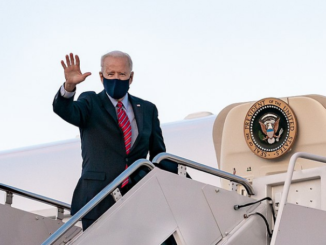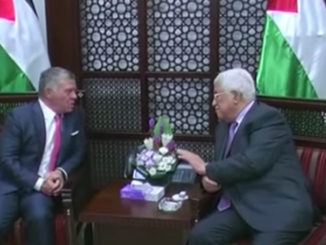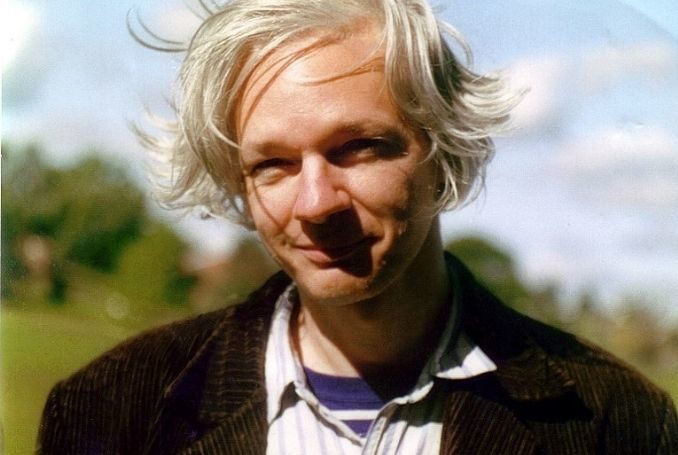
Faced with a barrage of criticism from some of his followers, George Monbiot, the Guardian’s supposedly fearless, leftwing columnist, offered up two extraordinarily feeble excuses this week for failing to provide more than cursory support for Julian Assange over the past month, as the Wikileaks founder has endured extradition hearings in a London courtroom.
The Trump administration wants Assange brought to the United States to face espionage charges that could see him locked away in a super-max prison on “special administrative measures”, unable to have meaningful contact with any other human being for the rest of his life. And that fate awaits him only because he embarrassed the US by exposing its war crimes in Afghanistan and Iraq in the pages of newspapers like the New York Times and Guardian – and because Washington fears that Assange, if left free, would publish more disturbing truths about US actions around the globe.
But there is much more at stake than simply Assange’s rights being trampled on. He is not simply the western equivalent of Ai Weiwei, the Chinese artist and dissident who notably offered his own support to Assange during the hearings. Weiwei covered his mouth outside the Old Bailey courtroom in protest at the media’s blanket silence over the crimes being perpetrated against Assange.
Ai Weiwei knows all about the crushing of political dissent by vengeful states, which is why he staged a silent protest outside the show trial of Julian Assange at the Old Bailey in London https://t.co/uOQug77KWY
— Jonathan Cook (@Jonathan_K_Cook) September 28, 2020
Assange faces a terrifying new kind of extraordinary rendition – one conducted not covertly by US security services but in the full glare of publicity and, if the London court approves, with the consent of the British judiciary. If extradition is authorized, a precedent will be set that allows the US to seize and jail any journalist who exposes its crimes. Inevitably, that will have a severe chilling effect on all journalists investigating the world’s only super-power. It will not only be the death of journalism’s already enfeebled role as a watchdog on power but a death blow against our societies’ commitment to the principles of freedom and openness.
The Barest Minimum
This should be reason enough for anyone to be deeply concerned about Assange’s extradition hearing, most especially journalists. And even more so a journalist like Monbiot, whose work’s lifeblood is the investigation of unaccountable power and its corrosive effects. If any British journalist ought to be shouting from the rooftops against Assange’s extradition, it is Monbiot.
And yet, he has failed to write a single column in the Guardian on Assange, and in response to mounting criticism from followers pointed to three retweets backing Assange during the past four weeks of extradition hearings. All three, we should note, were of articles published in his own newspaper, the Guardian, that broke with its hostile coverage and could be considered vaguely sympathetic to Assange.
“He is in prison because he informed you of actual crimes and atrocities being committed by a foreign power." #FreeJulianAssange https://t.co/mwI34SuENw
— George Monbiot (@GeorgeMonbiot) October 2, 2020
This was the barest minimum that Monbiot could afford to be seen doing. After all, positioned as the Guardian’s leftwing conscience, it would have been strange indeed had he not retweeted the rare instances, in a sea of Guardian articles ridiculing and vilifying Assange, of the paper making a nod to its more leftwing readers.
But notably, Monbiot failed to retweet any of the daily articles posted by former UK ambassador Craig Murray that detailed the horrifying abuses of legal process against Assange during the extradition hearings as well as evidence from expert witness after expert witness that demolished the central claims of the US case. Monbiot did not retweet any of the articles or comments by the renowned investigative journalist John Pilger, who has been a stalwart defender of Assange.
.@DeclassifiedUK has now published 7 investigations into legal irregularities and conflicts of interest in the Assange US extradition case. Thread.
(Number 8 is coming this week)
— Matt Kennard (@kennardmatt) September 27, 2020
He did not retweet the testimony of Noam Chomsky, the celebrated linguist and political analyst, that the US charges against Assange are entirely political in nature and therefore void the US extradition request. Monbiot has similarly ignored the comments of Nils Melzer, the United Nations expert on torture, that Assange is already being psychologically tortured by the combined actions of the UK and US to keep him locked up in extreme isolation and in a prolonged state of chronic fear for his future.
Monbiot also did not retweet the astounding evidence last week from a former employee of the Spanish company that provided security at the Ecuadorian embassy, where Assange spent seven years in political asylum. The whistleblower testified that under CIA direction the company broke the law by surveilling Assange, even in the toilet block, and listened in to his privileged conversations with his lawyers. This fact alone should have been enough to force the presiding judge, Vanessa Baraitser, to rule against the US extradition request.
Stunning evidence submitted at Assange's extradition hearing of an illegal CIA bugging operation against him and burglary of his lawyer's offices, as well as US plans to kidnap and poison Assange – all denied a proper airing in court by the judge https://t.co/uRfItwGdms
— Jonathan Cook (@Jonathan_K_Cook) October 1, 2020
Cowardly excuses
No, Monbiot told his followers about none of these developments or about much more that has emerged over the past four weeks. Instead, he offered two cowardly excuses for why he has remained so mealymouthed at the worst assault on press freedom in living memory.
The first was that the Assange extradition hearing apparently isn’t important enough. It is simply “one of hundreds of crucial issues” and “compared to say, soil loss, it’s way down my list”.
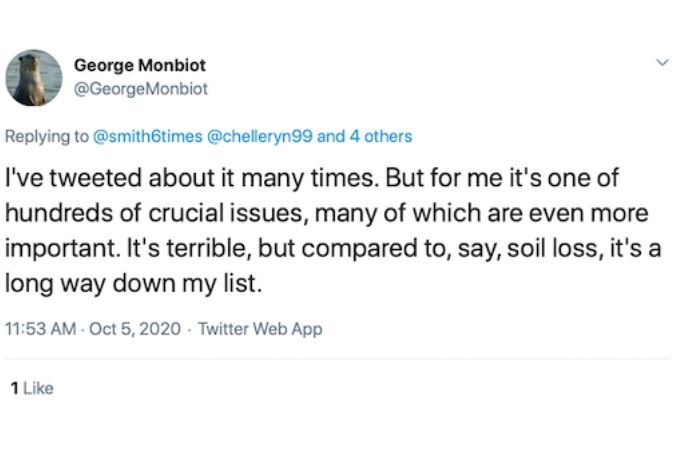
No one can doubt that Monbiot rightly takes environmental issues extremely seriously. But he doesn’t just tweet and write about the environment. There are many others issues, entirely unconnected to the environment and of which he appears to know almost nothing, that he regularly writes about.
One will suffice as illustrative. For the past two years Monbiot has dedicated a great deal of time and energy – time and energy he has refused to expend on defending Assange and press freedom – to attack those who have questioned claims by the US and UK intelligence services that the Syrian government under Bashar Assad carried out a chemical weapons attack in Douma in April 2018. The supposed attack provided the pretext for the US to launch a bombing attack on Syria – an example of a supreme international crime, according to the Nuremberg principles.
Say, for the sake of argument, there wasn’t a CW attack at Douma (unlikely to be true, in view of the evidence). It would be one great crime Assad had not committed, against tens of thousands he has. Yet this is the issue you obsess about. Why? Because you’re apologists.
— George Monbiot (@GeorgeMonbiot) November 5, 2019
Monbiot has tried to intimidate into silence those, including whistleblowers from the Organisation for the Prohibition of Chemical Weapons (OPCW), who have suggested that in fact, the evidence points to jihadist groups being responsible for what happened in Douma. Those jihadists – labeled “terrorists” by the western media in all countries other than Syria – have been explicitly financed by western allies like Saudi Arabia, and more covertly by the west itself. Nonetheless, Monbiot has smeared anyone skeptical of the official western narrative about Douma as an “Assad apologist”, including by implication the distinguished Middle East reporter Robert Fisk, who, unlike Monbiot, actually visited Douma.
My latest: How did liberal media like the Guardian deal with the first on-the-ground reporting in Douma from veteran Middle East reporter Robert Fisk? They managed the difficult task of denigrating his account while ignoring the fact that he was ever there https://t.co/PemzQTFw9u
— Jonathan Cook (@Jonathan_K_Cook) April 18, 2018
Monbiot has no expertise on the Middle East, and presumably has drawn his conclusions from reading the Syria coverage of the Guardian, whose positions he precisely echoes. It is bad enough that he has used his platform to go on the offensive against those taking a critical position on the events in Douma. But worse still, he has swept up in his smear campaign whistleblowers from the OPCW, the United Nations’ chemical weapons watchdog body, who have been warning that the OPCW is no longer independent but has become a deeply politicized body that tampered with the inspectors’ findings in the Douma case to bolster Washington’s self-serving agenda in Syria.
New — one of the most important pieces I've written: OPCW leaks suggest that the US bombed Syria on false grounds, and the US media is ignoring the veteran scientists who challenged the cover-up from inside. https://t.co/2Obhq99f6s
— Aaron Maté (@aaronjmate) July 24, 2020
The whistleblowers’ claims are hardly out of line with the wider picture of the OPCW. The organization has been falling under Washington’s thumb for nearly two decades. The previous head of the OPCW, Jose Bustani, was forced out by the Bush administration after he sought to negotiate further weapons inspections of Iraq to deprive the US of a pretext to launch its illegal invasion in 2003. Angry that US plans for regime change might be disrupted, John Bolton, the warmongering US ambassador to the UN, even threatened Bustani: “We know where your kids live.”
At least three members of the OPCW team that investigated the Douma events have tried to warn that the evidence blaming Assad was doctored by the organization’s officials and that their own research showed that the most likely culprit were jihadist groups – who presumably hoped to engineer a pretext for more direct western intervention in Syria to help them bring down the Syrian government.
Misinformation around the Douma events has grown so dire that Bustani himself recently tried to intervene on behalf of the whistleblowers at the Security Council. He noted in testimony blocked by the US and UK: “At great risk to themselves, they [the whistleblowers] have dared to speak out against possible irregular behavior in your Organisation [the OPCW].” He added: “Hearing what your own inspectors have to say would be an important first step in mending the Organisation’s damaged reputation.”
Ex-OPCW chief Jose Bustani reads Syria testimony that US, UK blocked at UN https://t.co/6tasCS7IqT via @TheGrayzoneNews
— Caitlin Johnstone
(@caitoz) October 5, 2020
Absurd Argument
There are plenty of reasons, therefore, to criticize Monbiot for his smearing of the Douma skeptics and the OPCW whistleblowers. But I am not interested here in revisiting the Douma episode. The point I am making relates to Assange.
In asserting that he doesn’t have time to defend Assange, Monbiot is implicitly arguing that opposing the current all-out war by the US on journalism is a lower priority than his smearing of the OPCW whistleblowers; that bullying and silencing Douma skeptics is one of those “hundreds of crucial issues” more important than preventing Assange from spending the rest of his life in jail, and more important than saving investigative journalism from this gravest of assaults by the US.
To understand how absurd Monbiot’s argument is, let us note that the only way we can ever properly settle the Douma case – without regurgitating claims by the US and UK intelligence services, as Monbiot has been doing – is if someone manages to leak the classified communications on Douma between the US administration and the OPCW leadership. That would let us know whether it is the OPCW whistleblowers telling the truth or the suits in head office. The whistleblowers have already stated that US officials turned up at an OPCW meeting unannounced and in violation of the body’s independent status in a bid to lean on staff.
The only way we will learn the truth with any certainty is if there is a leak of documents – to an organization like Assange’s group Wikileaks.
The war on Assange has not only been a war on journalism. It is also a war on the whistleblowers who have assisted journalists and Wikileaks in arriving at the truth. Hanging on the outcome of Assange’s case is not only his personal fate, but journalism’s very ability to tap into sources close to the centers of power. In abandoning Assange, we abandon any hope of finding out the truth on a whole range of the most pressing issues facing us.
If Monbiot hopes to be able to campaign more effectively on “hundreds of crucial issues” like soil loss and other environmental concerns, he needs Assange and Wikileaks as vigorous as possible, not Assange locked away in a dark cell and Wikileaks a shadow of the organization it once was.
Monbiot, of course, does not need me to tell him all this. He understands it already. Which is why his behavior needs explaining – a matter we will get to in a minute.
All Too Ready to Tick Boxes
But before that, let us turn our attention to his second, extraordinary excuse for failing to raise his voice above a whisper on Assange’s plight.
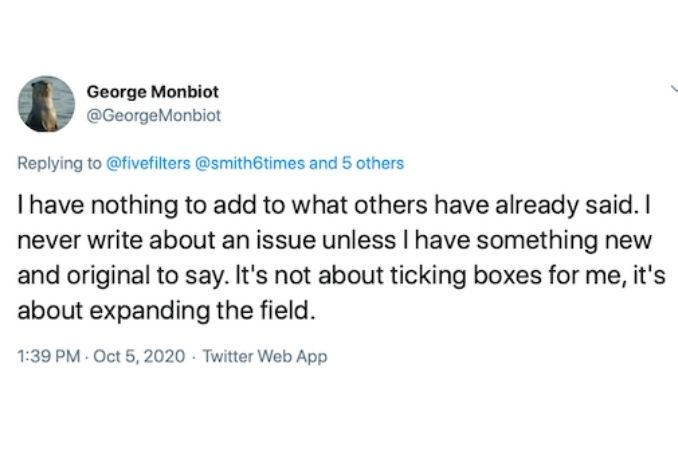
Monbiot claims he cannot add anything “original” to what has been said already about the Assange case and that “It’s not about ticking boxes” but about “expanding the field”.
Let us set aside the obvious lacuna in this argument: that Monbiot has been ticking every box imaginable on the Douma incident. He added precisely nothing to the debate apart from his own smears of the whistleblowers. All he did was echo the intelligence services’ talking points, which had already been given an extensive and uncritical airing in the Guardian.
So Monbiot is quite clearly capable of being highly unoriginal when he chooses to be.
But there are, of course, lots of original things Monbiot could contribute to the coverage of the Assange case in his own newspaper, the Guardian, given that the only people speaking up for Assange – apart from one article by Patrick Cockburn in the Independent – have been outside the “mainstream”, without a platform in the corporate media.
Patrick Cockburn in the Independent explains why the US wants Assange locked out of sight for good, and why other journalists in the corporate media have failed in their duty to protest against this all-out assault on press freedom https://t.co/uN4V2VVIKq
— Jonathan Cook (@Jonathan_K_Cook) October 4, 2020
Monbiot could have served as a counterweight to the relentless maligning of Assange in the Guardian’s pages by pointing out how these smears were unfounded. Instead, he has either echoed those smears, or equivocated on them, or remained silent. He could have, for example, observed that there were very good grounds for Assange to seek political asylum in the Ecuadorian embassy, as the extradition hearings have confirmed, in contrast to the constant claims in the Guardian that Assange was “fleeing rape charges” – charges that existed only in the imagination of newspaper editors – or that he was paranoid and arrogant.
The Guardian: Fake news and hostility toward Assange in 44 headlines. #DumpTheGuardian https://t.co/jwl5ZbEOL7
— FiveFilters.org
(@fivefilters) April 19, 2019
Or Monbiot could have pointed out that the Guardian fabricated an easily disproved smear story that a Trump aide, Paul Manafort, and unnamed “Russians” had supposedly visited Assange in the Ecuadorian embassy in secret three times – without leaving any evidence, even though the embassy was the most heavily surveilled building in London, both inside and out.
The story, presumably provided to the Guardian on an unattributable basis by one of the security services involved, was published to ensnare Assange in evidence-free Russiagate claims and thereby alienate liberals so that they would not oppose the US extradition case. Monbiot could have added that the Guardian was wrong not to apologize for the deceitful, malicious report and retract it.
There is, needless to say, no hint or suggestion in the Mueller Report that Paul Manafort visited Julian Assange ever in his life, let alone 3 times in the Ecuadorian Embassy during the election. It would obviously be there if it happened. How can the @guardian not retract this?? pic.twitter.com/5ory1w0mfj
— Glenn Greenwald (@ggreenwald) April 18, 2019
Or Monbiot could tell his readers that the Guardian is not declaring a glaring conflict of interest in its coverage of the Assange hearings. Rather than being a neutral observer of developments, the paper is in fact deeply implicated in the very charges leveled by the US against Assange. Its former investigations editor David Leigh was the one who recklessly published the password to a critically important trove of secret documents held by Wikileaks, giving every security service in the world access to them. Eventually, in a damage limitation operation, Wikileaks was forced to publish the files unredacted to let anyone named know they were in danger.
If anyone should be on trial for endangering US informants – no one should be, and no informants were harmed – it is not Assange but Leigh and other senior Guardian editors.
My latest: The Guardian finally broke its silence last week after US lawyers had given it star billing in their efforts to extradite Assange.
But the paper's deceit-riddled statement steeped it even further in betrayal of Assange and of press freedom https://t.co/4z2R3zflzr
— Jonathan Cook (@Jonathan_K_Cook) September 28, 2020
All of these would be highly “original” things for Monbiot to write about that would undoubtedly “expand the field”. But I am not really suggesting that he go so far as to be honest about the vile role played by his employer in selling out Assange. I am worldly enough to know how things work. He has a good, mainstream platform that weekly publishes his articles – and he does not want to jeopardize that by criticizing his own newspaper.
But of course Monbiot does not need to criticise the Guardian to support Assange. There are plenty of other, important things to write about if he chooses to. The point is he chooses not to. The real question, once his pathetic excuses are stripped away, is why.
Mopped up by the Guardian
And that, sadly, is because Monbiot is not the free thinker, the fearless investigator of difficult truths, the leftwing conscience he claims to be. It is not really his fault. It is in the nature of the function he serves at the Guardian – and with which I am only too familiar myself from my years working there.
The Guardian is the main outlet of the Guardian Media Group, which depends on advertising to survive. It is a corporate venture premised on exploiting the Guardian’s market share to the greatest extent possible, just as the Daily Mail, the Sun and the Times do with their own markets. In this regard, newspapers are no different from supermarkets. If they fail to corner their section of the market, another corporation better suited to do so will step in and seize it from them.
Assange understood this only too well, as he explained in an interview back in 2011 after learning that the Guardian had been breaking its agreements with Wikileaks and sharing confidential files with others. He observed:
“What drives a paper like the Guardian or New York Times is not their inner moral values. It is simply that they have a market. In the UK, there is a market called ‘educated liberals’. Educated liberals want to buy a newspaper like the Guardian and therefore an institution arises to fulfil that market.”
Most of the Guardian’s writers pander squarely to the general “educated liberals” market. But some, like Monbiot, are there with a more specific purpose: to mop up sections of the population that might otherwise stray from the Guardian fold.
Owen Jones is there to mop up leftwing supporters of the Labour party to persuade them that the Guardian is their friend, as he continued to do even while the paper was helping to destroy the party’s elected leader, Jeremy Corbyn. Jonathan Freedland is there, in part, to reassure liberal Jews that the Guardian is on their side, which he did by playing up the evidence-free smears that Labour had an especial antisemitism problem under Corbyn. Hadley Freeman is there, as are others like Suzanne Moore, to represent liberal women deeply invested in identity politics and to make sure they keep them away from class politics.
The point is that the Guardian is a corporate endeavor that makes sure its columnists cover as many liberal-left bases as possible without allowing any really subversive voices a platform from which they can challenge or disrupt the neoliberal status quo.
Monbiot, therefore, treads the finest line of all the Guardian’s columnists. His position is the most absurd, the one plagued with the biggest internal contradiction: he must sell extreme environmental concern from within a newspaper that is entirely embedded in the economic logic of the very neoliberal system that is destroying the planet.
The Guardian understands its own urgent need to greenwash too. Its market, educated liberals, are increasingly frightened by the multiple environmental threats we face, which is why very belatedly – decades late, in fact – the paper has been prioritizing this issue above all others.
But of course, given the logic of its corporate, money-making, advertiser-driven agenda, the Guardian is not just highlighting the threat to the environment to win over more educated liberals. It is also monetizing this threat for itself as aggressively as it can. It did so again this week as its editor, Kath Viner, appealed to educated liberals to make a subscription donation to the paper based on the claim that it will campaign to protect the environment better than any other UK newspaper. That, of course, is a remarkably low bar it has set for itself.
The Guardian under @KathViner did everything in its power to destroy climate action committed @jeremycorbyn & so ensure climate destroying Tory govt elected. But then says its top priority is climate energency, whilst selling longhaul flight Guardian holidays! . ?@XRebellionUK pic.twitter.com/Gx10yfcy3c
— Donnachadh McCarthy (@DonnachadhMc) October 5, 2020
Treading a Fine Line
Monbiot is trapped in this same logic: campaigning for the environment from within an organization whose economic imperatives are designed to trash the planet.
He treads this very fine line by deviating as little as necessary from the Guardian’s own narrow, status quo-hugging agenda. He enjoys the freedom to speak out loudly on the dangers of environmental destruction, but that freedom comes at a price – that he closely adhere to the technocratic, liberal consensus on other issues. The paradox is that on foreign policy matters we have Monbiot effectively colluding in the propaganda of the west’s war industries – the most polluting on the planet – as he professes his environmental credentials to the Guardian’s liberal readers.
This stance is not imposed on him. He does not receive orders from Guardian editors to smear OPCW whistleblowers or to restrain himself from tweeting forthright support for Assange. Instead, he has imbibed the corporate culture of the Guardian – as I once did, as most of us do in our daily lives – as a sanity survival strategy, as way to placate the cognitive dissonance that would overwhelm him if he did not.
Paradoxically, the two excuses he offered justifying his lack of support for Assange followed a tweet in which he had just castigated the left – as he is wont to do when confronted with evidence he would rather not hear – for preferring conformity over solidarity.
One of the biggest mistakes on the left is the confusion between solidarity and conformity. Solidarity does not mean a ticklist of prescribed beliefs.
The demand for conformity destroys solidarity.— George Monbiot (@GeorgeMonbiot) October 5, 2020
I’m no psychologist, but this sounds suspiciously like a projection to me. Monbiot was immediately and rightly pulled up by followers who pointed out that, in his abandonment of Assange, he had once again shown a high degree of conformity to official, intelligence agency-serving narratives, as well as to those of his employer, the Guardian. He had also shown a very low degree of solidarity with a man who has almost single-handedly taken on the western power establishment in the hope of helping us finally to hold it to account.
Ultimately, the problem lies not with Monbiot. He is just serving the market, attracting socially responsible liberals to the Guardian, rationalizing the paper’s reformist agenda within a suicidal, global, neoliberal economy, and preventing leftwingers from straying too far, to the point where they might contemplate a more revolutionary form of politics.
The problem lies not with Monbiot. It lies with us. We continue to ignore the fact that we are being played by the system, that we are being placated by pale offerings like Monbiot, that our consent is needed and that we keep finding reasons to give it rather than withdraw it. Neither Monbiot nor the Guardian is going to liberate our minds. Only we can do that.
– Jonathan Cook won the Martha Gellhorn Special Prize for Journalism. His books include “Israel and the Clash of Civilisations: Iraq, Iran and the Plan to Remake the Middle East” (Pluto Press) and “Disappearing Palestine: Israel’s Experiments in Human Despair” (Zed Books). Visit his website www.jonathan-cook.net. He contributed this article to The Palestine Chronicle.

– Jonathan Cook won the Martha Gellhorn Special Prize for Journalism. His books include “Israel and the Clash of Civilisations: Iraq, Iran and the Plan to Remake the Middle East” (Pluto Press) and “Disappearing Palestine: Israel’s Experiments in Human Despair” (Zed Books). Visit his website www.jonathan-cook.net. He contributed this article to The Palestine Chronicle.


